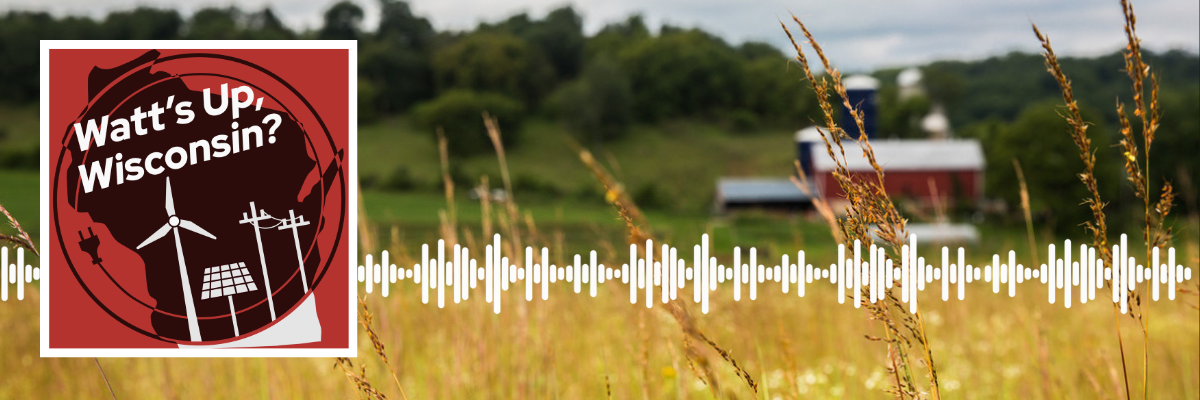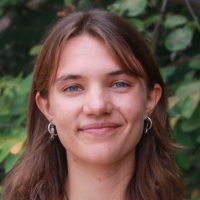
The world of energy is a confusing and ever growing field. Microgrids, agrivoltaics, alternative battery storage, bioenergy – it can be tricky to understand what these new technologies are, let alone how they impact you. Produced by the Wisconsin Energy Institute, Watt’s Up, Wisconsin? takes on these big topics in energy, breaking down what they are and what they mean for Wisconsinites.
Do you have a question about energy in Wisconsin? Ask the Wisconsin Energy Institute at communications@energy.wisc.edu or tweet us and tag #WattsUpWI.
Apple podcasts • Spotify podcasts • Google Podcasts • Castbox
Shining a Light on Energy Justice
Every time we flip a switch, it's connected to an energy bill. But, the impact of that energy bill isn't the same for everyone. For many Americans, they experience unaffordable energy bills and undue energy burden–spending a greater portion of their income on energy bills than the average household. In this episode, we look at energy justice and ways we can make energy equitable for all. We speak to Jaime Garibay Rodriguez about his research into carbon lock-in and the barriers to adopting cleaner, and cheaper, energy technologies.
Energy Storage: Combatting the Duck
In this episode, we look at energy storage, understanding how we will store energy for a renewable energy future and what ducks have to do with it. We speak to battery researcher Eric Kazyak about how battery storage fits into this picture, from grid scale storage to electric vehicles.
Bioenergy Basics: The Big Picture
We have talked about the basics of bioenergy and how we access energy from plants, but how does this fit into our lives? In the last episode of our series on bioenergy, we focus on how exactly biofuels fit into our lives and ways they have already made an impact.
Bioenergy Basics: the Conversion Conundrum
In part two of a three part series on bioenergy, we focus on how we extract energy from plants for bioenergy. We'll take a deep dive into the conversion step, accessing that plant's stored energy. We speak to bioenergy researcher Ben Hall on how yeasts and bacteria are used to eat up plants and produce fuels for our energy future.
Bioenergy Basics: Planting Photons
Bioenergy utilizes energy from plants to create fuels. But, how exactly do plants get so much energy? In part one of a three part series, Bioenergy Basics, we focus on how plants store energy, what crops are best for bioenergy, and how researchers are working to make these plants better. Bioenergy researcher Cullen Vens takes us on a photon's journey, following the energy from the sun to a plant.
How to Build Better
Buildings are unavoidable. We all use them. We turn on the lights, heat and cool our homes, run refrigerators, charge our devices. But buildings use a lot of energy. In this episode of Watt's Up, Wisconsin?, we break down why buildings consume so much energy and ways we can make buildings more efficient.
Creating Resilience through Microgrids
When extreme weather hits, energy grids can suffer, with power outages displacing communities from essential services. However, microgrids can be a solution. In this episode of Watt's Up, Wisconsin, we break down what exactly microgrids are, and how they create community resilience in the wake of extreme weather.
Agrivoltaics: a Both-And Solution
In this episode of Watt’s Up, Wisconsin?, we explore the field of agriculture and photovoltaics, known as agrivoltaics and the possibilities in WI. We speak to UW-Madison’s Henry Hundt and Josh Arnold about the future of agrivoltaic research in Wisconsin.
Trailer: Introducing 'Watt's Up, Wisconsin?'
The energy landscape is a web of interconnected systems, but that landscape is changing. New technologies are raising big questions on where we get and how we use energy. It can be difficult to understand what these technologies are, let alone how they impact you. This show tackles these big questions in energy.
Credits
 Britta Wellenstein | Host
Britta Wellenstein | Host
Britta is a communications intern at the Wisconsin Energy Institute and UW–Madison undergraduate majoring in Life Sciences Communication and Environmental Studies.
This podcast is produced by Britta Wellenstein and Michelle Chung.
Theme music by Eden Comer.
